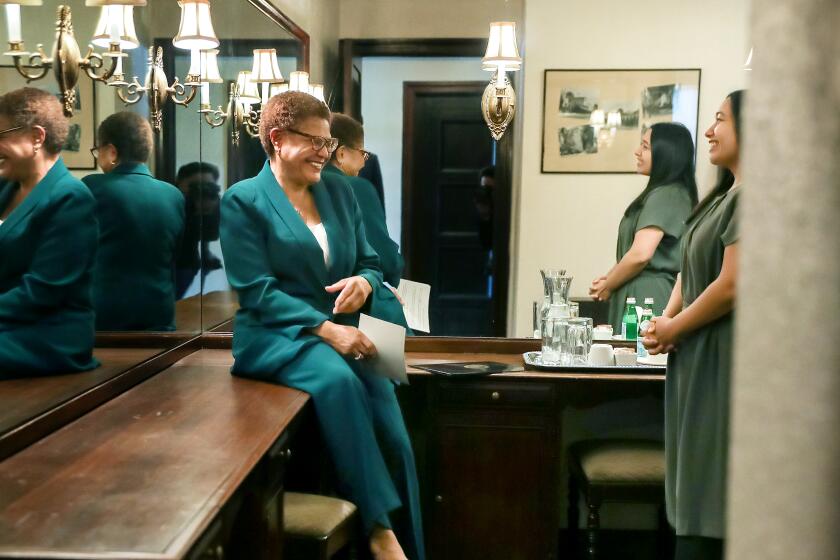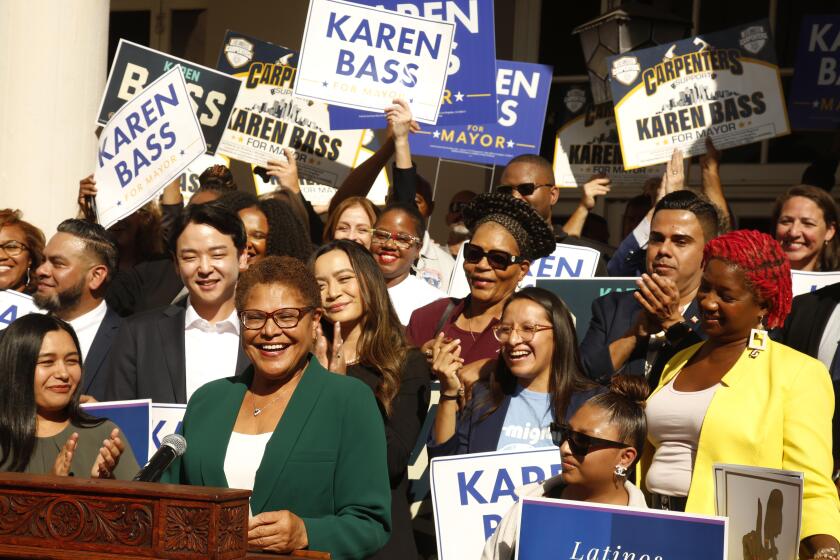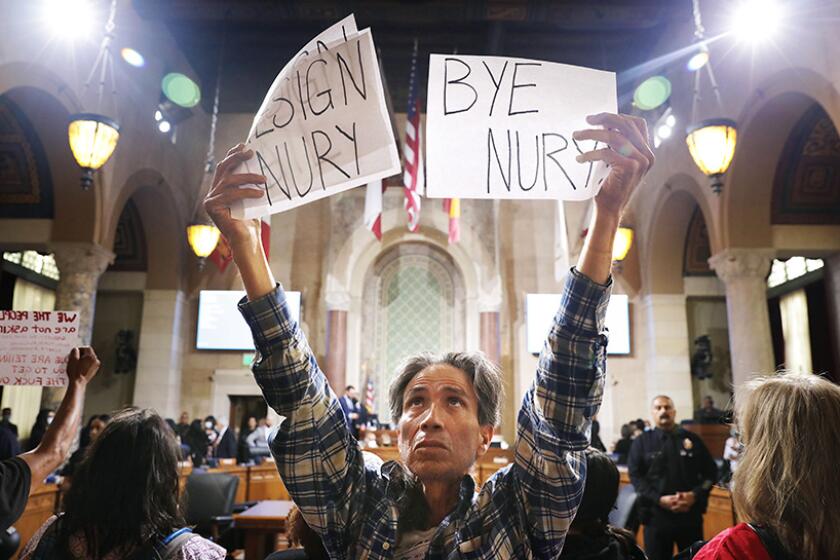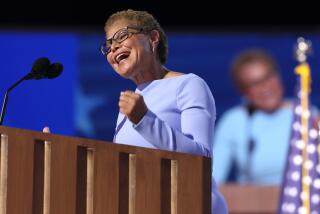For Black Angelenos, election of Karen Bass brings joy in a divisive time. But they want results
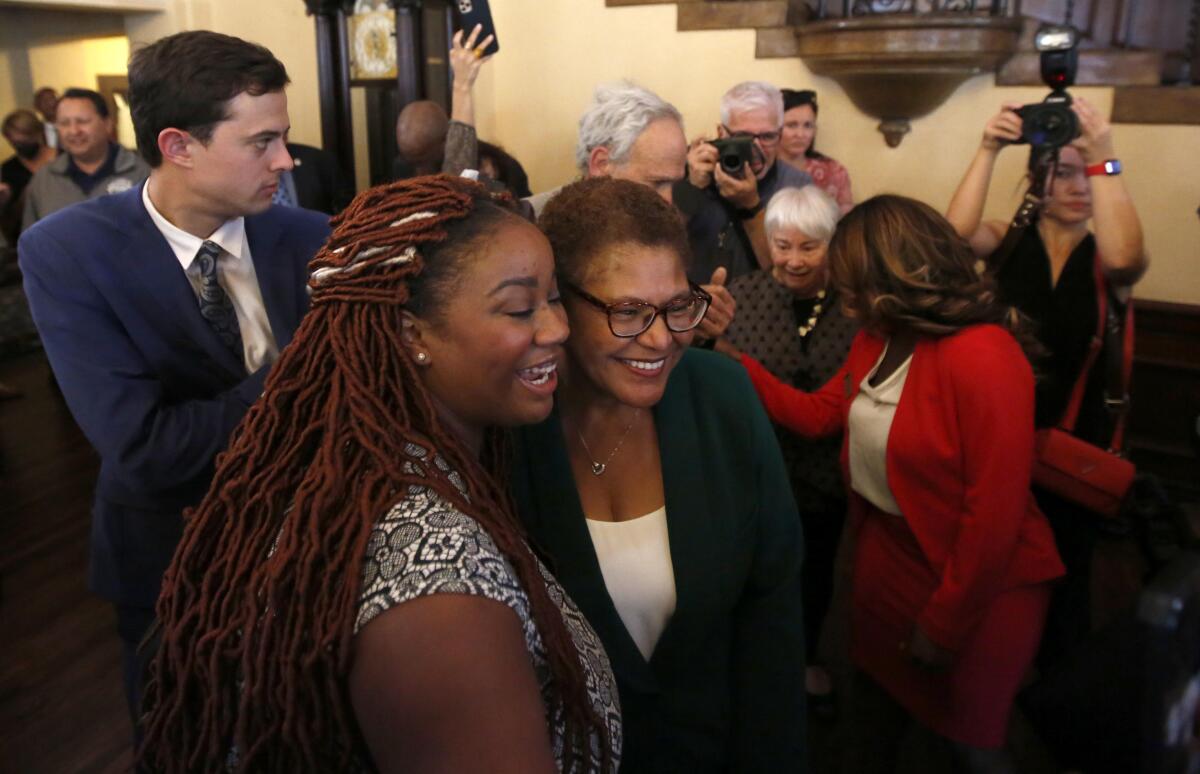
- Share via
Sade Elhawary was attending a conference at UCLA this week when a group text message on her phone started ping-ping-pinging.
It was the news she had longed for: Karen Bass had won. The 69-year-old congresswoman would become the first woman and only the second Black person in Los Angeles’ 241-year history to be elected mayor.
Elhawary, 34, started screaming with joy.
Elhawary is Black and Latina, and she was born and raised in the City of Angels. When Mayor Tom Bradley, the city’s first and only Black mayor, left office in 1993, she was just 5 years old.
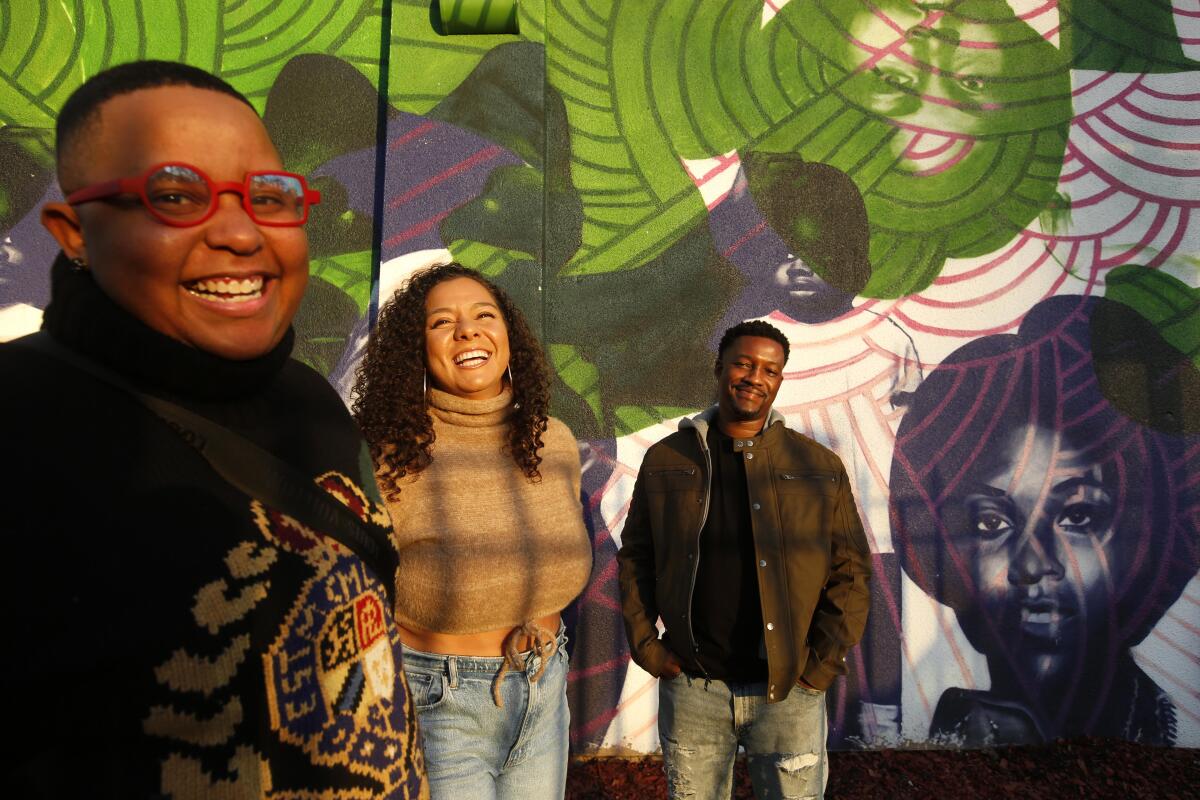
To be watching Bass make history nearly three decades later felt surreal, she said, her voice catching with emotion.
“We no longer have to wonder if one day a woman can do this. If one day a Black woman can do this,” said Elhawary, who worked on Bass’ campaign.
“You feel so seen. It feels so good to see her, another woman of color, represent the pinnacle of leadership in this city in a way that allows us to know we’re no longer going to be shut out of those conversations.”
For Black residents across Los Angeles, Bass’ ceiling-shattering victory over billionaire businessman Rick Caruso was both awe-inspiring and cathartic.
A late endorsement from former President Obama, along with the Supreme Court decision striking down Roe vs. Wade, helped propel Bass to victory.
Bass prevailed at a painful time for Black Angelenos, just one month after the release of a leaked audio recording that revealed top Latino officials making racist comments and scheming to maintain political power through gerrymandering.
In the recording, former L.A. City Council President Nury Martinez, who has since resigned, compared the Black son of a colleague to a monkey and, in a reference to L.A. County Dist. Atty. George Gascón, said: “F— that guy ... He’s with the Blacks.”
Along with the upheaval at City Hall, Bass inherits a city that is still recovering from the COVID-19 pandemic and grappling with a spiraling homelessness crisis — both of which have disproportionately harmed Black residents.
In halls of power long dominated by men, the new Madam Mayor will share significant power with the fractious City Council, as well as the L.A. County Board of Supervisors, which will remain all-female with the election of West Hollywood City Councilwoman Lindsey Horvath to the board.
Black Angelenos say Bass faces a lot of tough challenges — and that while they are cheering her on, they will also be the first to hold her accountable.
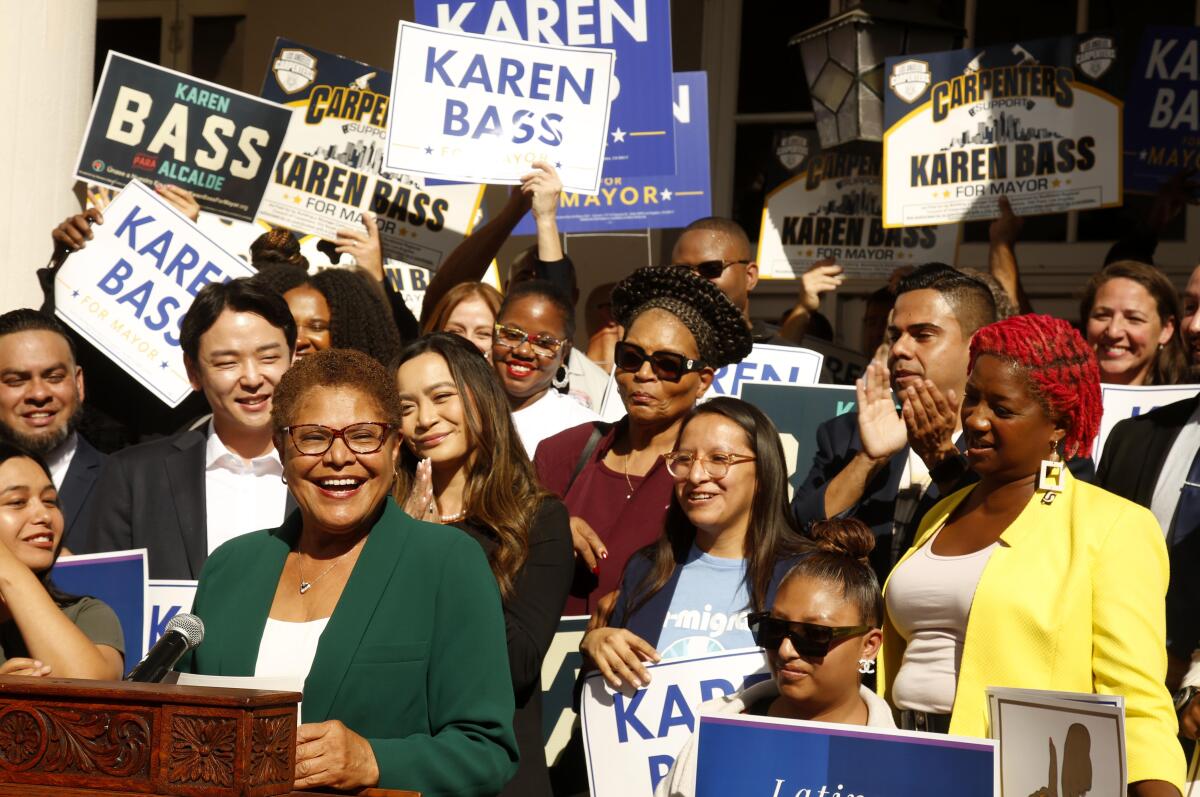
The day after she clinched the mayorship, Bass was the talk of the tables at CJ’s Cafe just off Obama Boulevard in Baldwin Hills, the neighborhood she has long called home.
Tony Scarbough, a regular customer who has seen Bass dining in the red booths many times, said her election is empowering for Black people like himself.
It won’t heal the widespread hurt caused by the racist audio recording, he said. But it’s a big step in the right direction.
“I think Karen Bass is a mender,” Scarbough said as he sipped coffee. “She knows how to bring people together, and she’s going to work for all people.”
As an Inglewood resident, Scarbough could not vote in the L.A. mayor’s race. But that didn’t stop him from driving all over the city, planting campaign signs for her.
When he heard on the radio that she had won, he pulled his car over and started shouting: “Yes! Yes! Yes!”
Scarbough runs a sober living home in South L.A. and said he trusts Bass, a former California Assembly speaker and six-term member of Congress, to actually do something about homelessness.
Rep. Karen Bass has just three weeks before she is sworn in as the first woman elected mayor of Los Angeles.
Black residents make up roughly 9% of L.A. County’s population, but 30% of its homeless population, according to the Los Angeles Homeless Services Authority.
Scarbough was unhoused for more than a decade. He said he fell into homelessness as a grieving young man after his aunt died in the 1978 Jonestown massacre in Guyana — in which the Rev. Jim Jones ordered hundreds of members of his California-based People’s Temple cult to consume a cyanide-laced drink.
Mayor-elect Bass has said that homelessness is her priority and that she will immediately declare a state of emergency. During the campaign, she put forth a plan to house more than 17,000 people during her first year.
Other customers at CJ’s Cafe said that Bass will have to prove herself, just like Bradley did when he became the first Black mayor in 1973.
Allen Fortier, a retired mortgage lender, said Bradley “played the game right and made a lot of things happen for the city. Everything he said he was going to do, he did it.”
Fortier, who is Black, said he voted for Caruso because he thought the developer could accelerate the building of more affordable housing and that Bass’ lofty goals for solving homelessness seemed unattainable.
But this week, Fortier said he was optimistic Bass would put her heart into it.
“The one thing about being a Black woman is that she’ll be diligent on whatever she takes on as a project,” he said. “She’ll see it through.”
In West Adams, Sue Green, a Black woman in her 50s, stopped halfway through her six-mile daily walk to explain why she voted for Bass.
“I think it’s her ability to be diplomatic, that’s what drew me,” she said.
“Now, I don’t think she needs to start a war at City Hall. She just needs to get going on checking off her list and moving beyond the racist talk to being a person of action,” Green said, referencing the leaked recording.
Green grew up in Alabama and has lived in Los Angeles, where she worked in the foster care system, for four decades. In choosing a new mayor, she and her walking buddy focused on “who’s going to do the best job.”
“None of us ever thought about her race or her background,” Green said. “We were thinking credentials.”
At the Washington Irving Library, Sally Stewart, a 29-year-old sales clerk who is Black, said she, too, was more concerned about results than milestones.
She learned Bass had won from her mother, who “was saying how historic this week is,” and her Black family members had been sharing their joy on social media. But “I think when we’re younger, being the first isn’t as important as just being successful,” she said.
“I think our city is crazy-messy,” Stewart said. “Look at how everyone is pointing to us because we’re dealing with so much trouble. Who can solve all this stuff?”
In Jefferson Park, Daniel Jackson, a security guard who is Black, kept watch over an outdoor commercial shoot while listening to MSNBC on his phone.
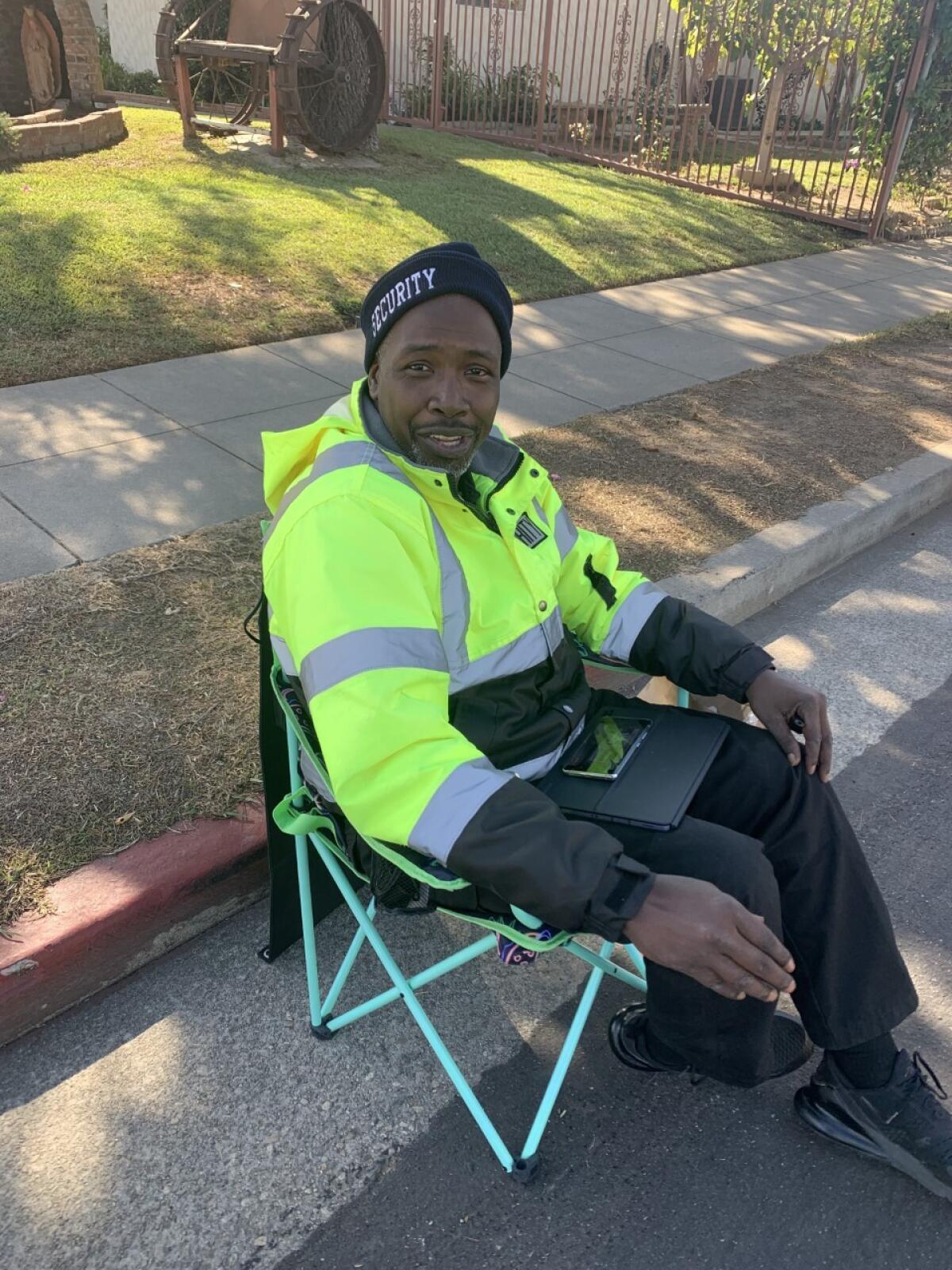
Jackson, 45, said he has two daughters and works hard “to empower them to reach any job.” He hopes Bass’ election will inspire them, and he believes having a woman in charge “will change the city.”
“Let’s see if the power-tripping men can get out of her way for her to do what’s most urgent, and that’s a long list,” he said. “Because she’s a woman, the spotlight will be intense — it doesn’t matter what race she is.”
At the Watts Coffee House on 103rd Street — where a “Karen Bass for Mayor” sign hung near the front door, and a life-size cardboard cutout of President Obama stood near the entrance — Marlo “Bow Wow” Jones showed off a picture he had just posted to Instagram of himself and other community activists posing with Bass during a campaign stop at the Jordan Downs housing project where he grew up.
For more than a week, Jones, 43, checked election results on his phone first thing in the morning as the race seesawed between Bass and Caruso.
“Every day, I woke up — dude, did she win?” Jones, 43, said. “What happened? Every morning. Did she win? Did she win? My heart was beating.”
When he learned she had won, he was elated. And struck by the history she made.
“I was just thinking — damn. The first Black woman to be the mayor of L.A.”
Even after the Obama presidency, he said, it still feels like Black people are not represented in the halls of power, especially in this city, where they make up a shrinking percentage of the population as more people move to the suburbs and out of state for cheaper housing, better schools and job opportunities.
For decades, L.A. Black and Latino political leaders formed vital alliances. But these partnership now face unprecedented challenges.
“For her being the first Black woman in the city of Los Angeles — our mayor — is big to the city,” and neighboring, historically black municipalities like Compton. “It’s big, because our race, over the years, it’s like we always fall short.”
Jones said he respected Bass’ authenticity and said he figures that’s why she connected with voters, despite being outspent more than 11 to 1 by Caruso, who pumped more than $100 million of his own money into the campaign.
Jones, a former gang member who spent years in prison, is now a community activist and volunteer who devotes much of his time to helping young people and homeless people in Watts. As he spoke, he was preparing to go shopping for a Thanksgiving meal and clothing drive he was helping to organize for unhoused people — and said he was grateful Bass is focusing on them.
Bass’ legacy will be made, he said, not by lofty political statements, but by what she does on the ground, in the community.
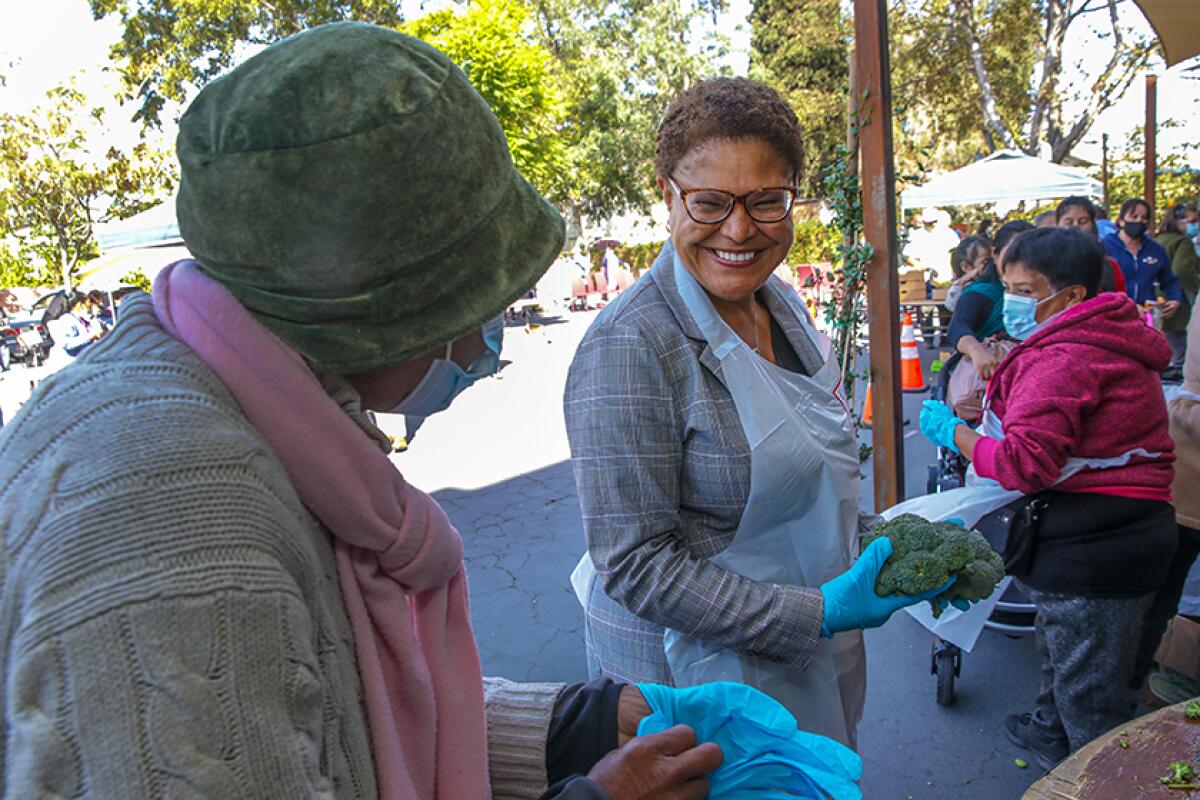
Jones said he holds Bradley in high regard because in 1989, when he was about 10, the mayor unveiled a new baseball diamond at Jordan Downs.
“I had the pleasure of shaking his hand,” he said. “The next time I met a mayor of L.A.? It was Karen Bass. And they’re both African Americans.”
Elhawary, the treasurer for Black Los Angeles Young Democrats — a group founded a decade ago in Bass’ living room — said the new mayor’s victory came at just the right time.
“Karen winning represents such an opportunity for healing in this city,” she said.
Last month, Elhawary donned a T-shirt that said, “I’m with the Blacks” — a reference to Nury Martinez’s denigrating comment — and stood before the City Council, calling for investigations and resignations.
“We need to ensure that the gerrymandering that was happening behind closed doors is looked at ... so that we as Black people, as people of color, as Latinx folks can ensure that we all have the political representation that we deserve,” she told the council.
Elhawary said Bass made her and other young people dare to be hopeful.
“She is someone who wants to build coalitions,” Elhawary said. “She is not just saying it to say it. She’s for real. That’s huge.”
More to Read
Sign up for Essential California
The most important California stories and recommendations in your inbox every morning.
You may occasionally receive promotional content from the Los Angeles Times.
